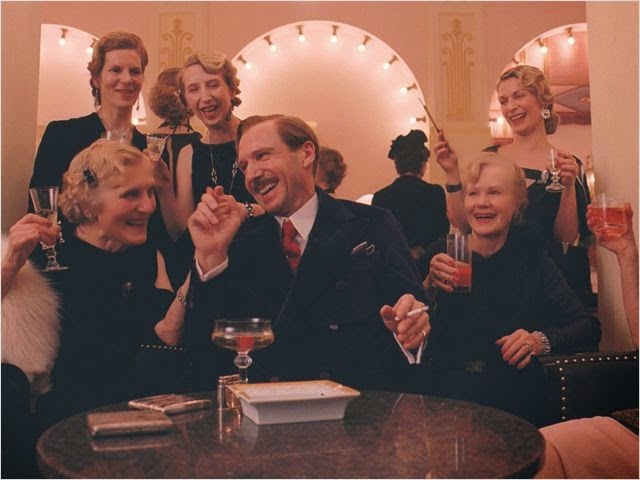A fastidious hotel concierge (Ralph
Fiennes) who’s a hit with the elderly ladies is willed a priceless
masterpiece of a painting when a dowager (Tilda Swinton in baroque
old age makeup) inevitably expires. He hasn’t got any time to enjoy
it thanks to the machinations of a moustache-twirling evil heir
(Adrien Brody) and his violent henchman (Willem Dafoe), but you have
about over 90 minutes to savour a carefully-crafted comic caper.
This caper, fittingly, is a pastiche,
flitting between genres, narrative techniques, mise-en-scene of films
from the 1920s to the early 1940s. There is the elaborate sexual
caper set in a grand hotel that is evocative of Ophuls and Lubitsch,
a German Expressionist chase through a museum using just lights and
exaggerated shadows, a prison escape sequence that recalls The Great
Escape but involving a far more circuitous and amusing route, and of
course that shaggy dog story and wild goose chase involving a
painting that might have been out of ‘Allo ‘Allo.
And not to mention the continual comic
references to the previous film roles of the cast: Goldblum gets his
fingers cut off like The Fly, F Murray Abraham narrates a
long-gone era like Salieri in Amadeus, Edward Norton plays his
inspector like an overaged Boy Scout from Moonrise Kingdom,
while the sinister henchman Willem Dafoe plays is constantly filmed
in under-lit scenes recalling his turn as Count Orlock in Shadow
of the Vampire.
The silly caper, the genre pastiche,
and the comic references all hang together somehow, some say because
of Wes Anderson’s meticulous, precise approach to set design,
screen composition, and devotion to the long panning shot. Rather, it
is due to Anderson’s vision and Anderson’s realisation that this
vision is allied with Ralph Fienne’s concierge. Murray’s grown-up
lobby boy has this to say about his former boss, but it could equally
be said for Wes Anderson’s film, which ultimately must be seen as
an allegory for the art of filmmaking itself: “His world had
vanished long before he had entered it. But I must say he certainly
sustained the illusion with a marvellous grace.”
Or if you like, The Grand Budapest
Hotel succeeds because it is a film that a fan of cinema would
make as an attempt to learn filmmaking. It is an exercise in
replicating the look and feel of different cinematic genres and
conventions, and sewing all these disparate homages, pastisches, and
spoofs into the space of one single narrative. It is a love letter to cinema,
and highly entertaining when done right—which is exactly what Wes
Anderson has achieved.


No comments:
Post a Comment